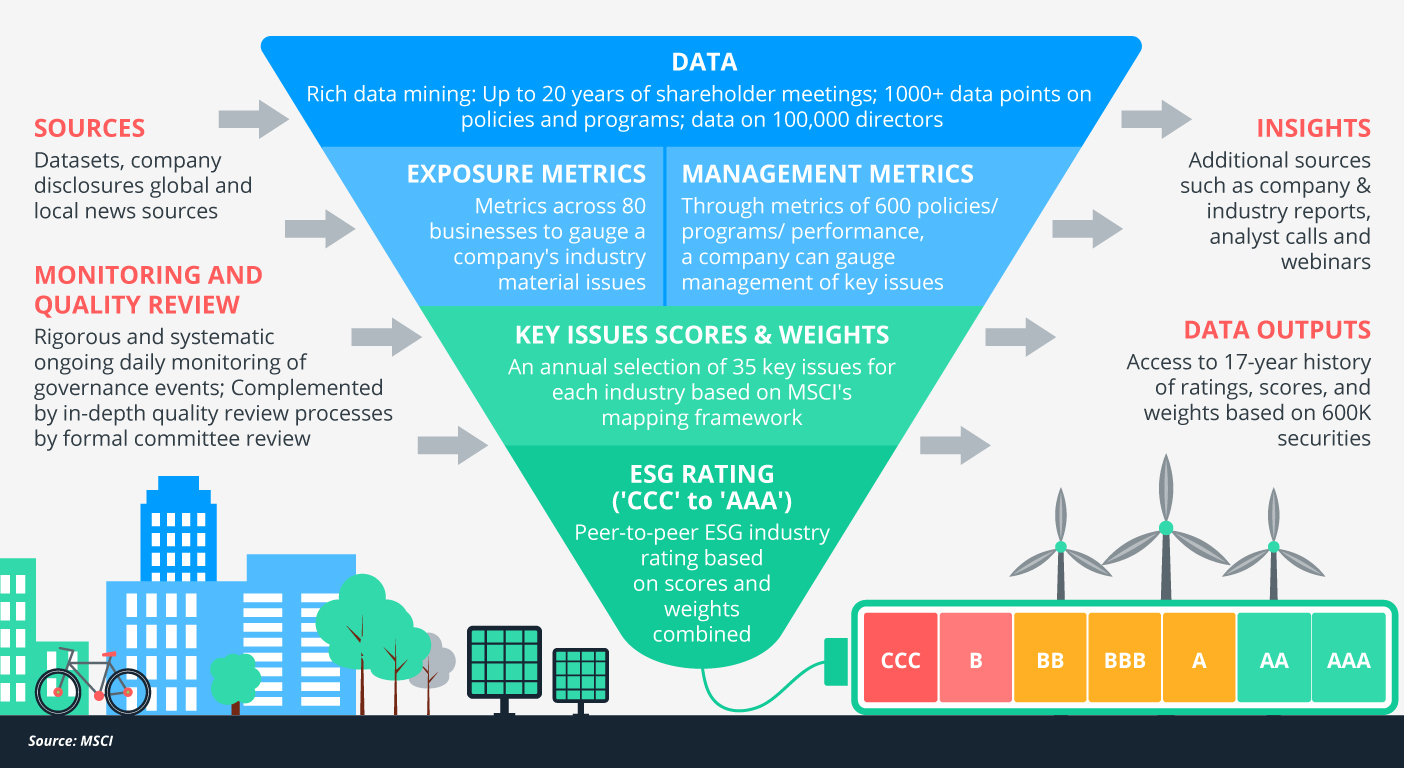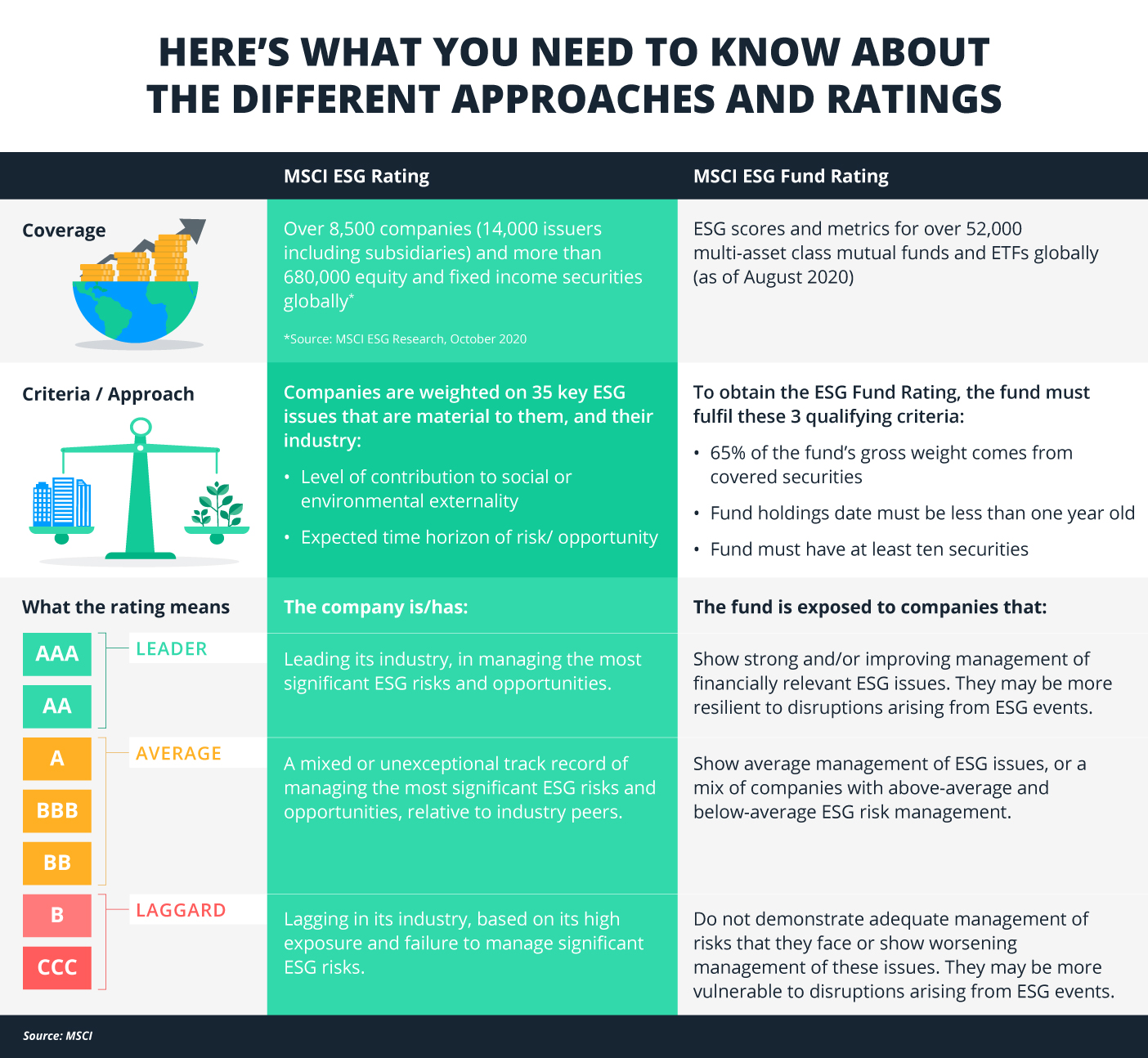Making sense of ESG ratings
![]()
If you’ve only got a minute:
- As more invest along sustainability lines, it is important understand ESG ratings better
- DBS adopts MSCI ESG Ratings to provide clients with greater transparency over the ESG characteristics of their investment portfolios
- Adding an ESG lens can help you identify fundamental sustainability risks, not picked up by conventional financial analysis
![]()
With the investment community placing a greater weight on investing in a socially responsible manner, more attention is being placed on evaluating companies using environmental, social and governance (ESG) factors. This is a step in the right direction. As investing along these lines gains more prominence, it is important that investors understand ESG ratings better.
As a refresher, you can find an overview of ESG factors below:

At DBS, we have adopted MSCI ESG Ratings (which cover equities, bonds and funds) to provide clients with greater transparency over the ESG characteristics of their investment portfolios.
Though relatively nascent in Asia, ESG investing is a growing trend that cannot be ignored. According to the CFA Institute, ESG assets under management in Asia have been the fastest growing since 2014.
This momentum is set to continue, driven in part by the impending intergenerational transfer of wealth to sustainability-conscious millennial investors. A 2017 FactSet study found that 90% of the high net worth millennials surveyed want to increase their allocations to responsible investments within five years.
DBS believes a properly structured ESG portfolio allows investors to align investments with personal values and reap the benefits of both.

What is an ESG rating?
An ESG rating indicates how well a company is managing ESG risks and opportunities, in comparison to its industry peers. According to a survey by SustainAbility, there are approximately 600 independent ESG ratings and rankings existing globally as of 2018.
While there is no universal ESG standard when evaluating companies, sustainable investing protocols have evolved greatly, especially in recent years.
Today, many firms work on approaches to rate ESG scoring metrics for investors (governments, companies, financial institutions, fund managers and individuals). This is one of the ways to address concerns surrounding what investments or investment strategies are ESG compliant and what type of ESG approach to take.
The labelling and scoring of funds on ESG-related metrics by these firms has helped to improve the classification of sustainable investment strategies. Funds are also scored based on the ESG characteristics of the underlying companies and whether managers have an intentional ESG mandate.
While there is currently no unified standard for sustainable reporting, there are frameworks and voluntary reporting guidelines and standards. This has resulted in improved transparency and ability to compare corporate reporting. Moreover, an increasing number of companies are making sustainability reporting mandatory.
Do note that ESG ratings are not about determining whether a particular investment approach is right or not. Instead, ratings aggregate the characteristics of a company or assets that form part of a fund.
Moreover, investors should not take ESG ratings at face value but try to understand the investment approach of a particular fund and the extent to which ESG considerations are a part of their process.
MSCI’s ESG methodology
MSCI’s ESG methodology is designed to measure a company’s resilience to long-term, financially relevant risks. Learn about the methodology below and what MSCI ESG Ratings mean, as you evaluate investment products.
The methodology aims to:
- Identify significant ESG risks and opportunities facing a company and its industry
- Determine the company’s exposure to those risks and/or opportunities
- Determine the company’s management of those risks and/or opportunities
- Ascertain the overview of the company, in comparison to its global industry peers

What do the ratings mean
MSCI uses a ‘CCC’ to ‘AAA’ scale to rate companies (ESG risk exposure and management, relative to industry peers), funds and exchange-traded funds (ETFs) based on the ESG characteristics of the portfolio.

How to incorporate ESG ratings in your investment analysis
Adding an ESG lens can help you identify fundamental sustainability risks, not picked up by conventional financial analysis.
Sieve out companies with stronger MSCI ESG Ratings amongst industry peers. Investing sustainably helps you mitigate risks by, for instance, excluding companies that are exposed to wastewater mismanagement, have unfair labour practices or material ESG issues that are poorly managed—all of which can have a detrimental impact on their reputation and performance.
If you wish to “do good” by injecting capital in companies that have a strong focus on ESG or adopted good practices to mitigate material ESG risks, you can use MSCI ESG Ratings as an initial guide to pick out suitable investments.
Ready to start?
Speak to the Wealth Planning Manager today for a financial health check and how you can better plan your finances.
Need help selecting an investment? Try ‘Make Your Money Work Harder’ on Plan & Invest tab in digibank to receive specific investment picks based on your objectives, risk profile and preferences.
Sources: “
CFA Institute, “ESG Disclosures in Asia Pacific.“ (2019, July 21). Retrieved on 17 Mar 2021.
DBS, “DBS furthers sustainability agenda with MSCI ESG Ratingsc Retrieved on 17 Mar 2021.
Factset, “The Importance of ESG Investing for HNWIs”. (2019, December 2). Retrieved 17 Mar 2021.
SustainAbility, “Rate the raters 2020”. Retrieved on 17 Mar 2021.
MSCI, “ESG Ratings”. Retrieved on 17 Mar 2021.
MSCI ESG Research, “MSCI ESG Ratings Methodology” November 2020. Retrieved on 17 Mar 2021.
MSCI, “MSCI ESG Metrics Calculation Methodology” December 2020. Retrieved on 17 Mar 2021.
MSCI, “What is a MSCI ESG Rating?” Retrieved on 17 Mar 2021.
Disclaimers and Important Notice
This article is meant for information only and should not be relied upon as financial advice. Before making any decision to buy, sell or hold any investment or insurance product, you should seek advice from a financial adviser regarding its suitability.
All investments come with risks and you can lose money on your investment. Invest only if you understand and can monitor your investment. Diversify your investments and avoid investing a large portion of your money in a single product issuer.
Disclaimer for Investment and Life Insurance Products








That's great to hear. Anything you'd like to add? (Optional)
We’re sorry to hear that. How can we do better? (Optional)